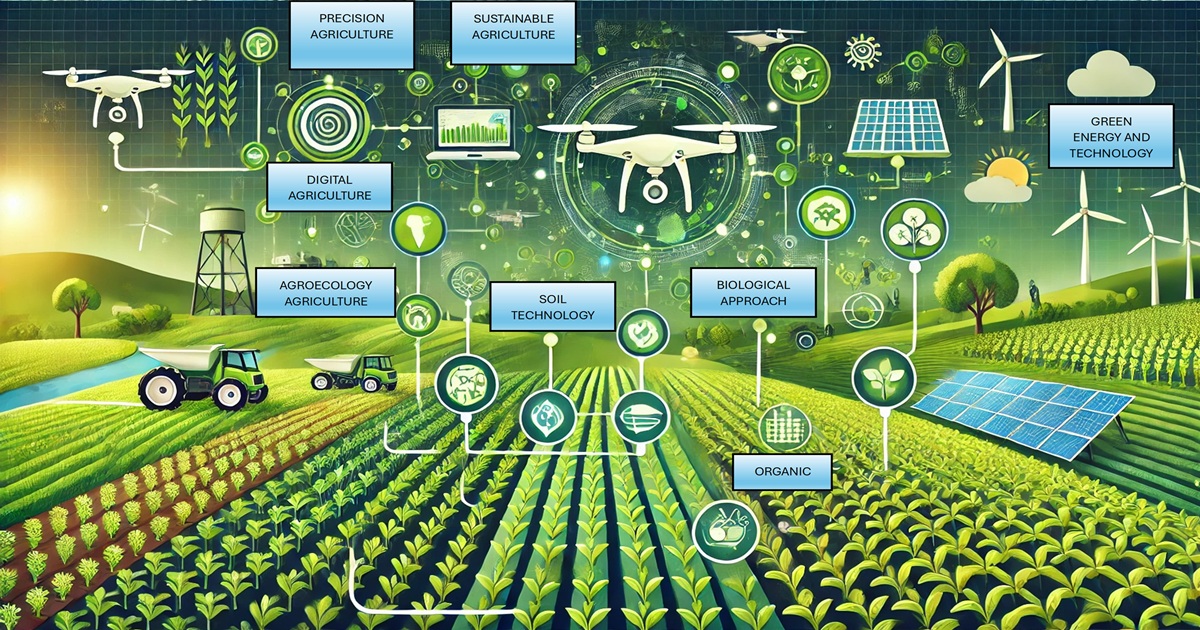Green Technology and Biological Approaches to Sustainable Agriculture
A special issue of Sustainability (ISSN 2071-1050). This special issue belongs to the section "Sustainable Agriculture".
Deadline for manuscript submissions: 15 July 2026 | Viewed by 10483

Special Issue Editor
Interests: encapsulation; plant nutrition and protection; colloid chemistry; biopolymers; surfactants
Special Issues, Collections and Topics in MDPI journals
Special Issue Information
Dear Colleagues,
This Special Issue, titled “Green Technology and Biological Approaches to Sustainable Agriculture”, explores the crucial role of green technologies and biological approaches in achieving sustainable agricultural practices. It addresses the growing need for environmentally friendly solutions to enhance food production while minimizing negative impacts on ecosystems. The scope encompasses a wide range of innovative technologies and biological methods, including precision agriculture, biofertilizers, biopesticides, conservation tillage, and integrated farming systems.
The purpose of this collection is to showcase cutting-edge research and advancements in green technology and biological approaches to sustainable agriculture. It aims at providing a platform for scientists, researchers, and practitioners to share their findings, exchange ideas, and foster collaborations. By highlighting the potential of these approaches, this Special Issue seeks to promote their adoption and contribute to the development of more sustainable and resilient agricultural systems. This collection builds upon existing knowledge and addresses current gaps in research, aiming at providing a comprehensive overview of the latest developments and challenges in the field, while also identifying future research directions.
Introduction: This Special Issue provides a scientific background on the principles and practices of green technology and biological approaches to sustainable agriculture. It highlights the importance of this research area in addressing global challenges related to food security, environmental degradation, and climate change.
Aim: The aim of this Special Issue is to showcase the potential of green technology and biological approaches for enhancing agricultural sustainability. It aligns with the journal's scope by focusing on innovative solutions that promote environmentally friendly and economically viable agricultural practices.
Suggested Themes:
- Precision agriculture and smart farming;
- Biofertilizers and biopesticides for crop production;
- Conservation tillage and soil health management;
- Integrated farming systems and agroecology;
- Water management and irrigation technologies;
- Climate-smart agriculture and carbon sequestration;
- Life cycle assessment and environmental impact analysis;
- Policy and governance for sustainable agriculture.
I look forward to receiving your contributions.
Prof. Dr. Marko Vinceković
Guest Editor
Manuscript Submission Information
Manuscripts should be submitted online at www.mdpi.com by registering and logging in to this website. Once you are registered, click here to go to the submission form. Manuscripts can be submitted until the deadline. All submissions that pass pre-check are peer-reviewed. Accepted papers will be published continuously in the journal (as soon as accepted) and will be listed together on the special issue website. Research articles, review articles as well as short communications are invited. For planned papers, a title and short abstract (about 250 words) can be sent to the Editorial Office for assessment.
Submitted manuscripts should not have been published previously, nor be under consideration for publication elsewhere (except conference proceedings papers). All manuscripts are thoroughly refereed through a single-blind peer-review process. A guide for authors and other relevant information for submission of manuscripts is available on the Instructions for Authors page. Sustainability is an international peer-reviewed open access semimonthly journal published by MDPI.
Please visit the Instructions for Authors page before submitting a manuscript. The Article Processing Charge (APC) for publication in this open access journal is 2400 CHF (Swiss Francs). Submitted papers should be well formatted and use good English. Authors may use MDPI's English editing service prior to publication or during author revisions.
Keywords
- sustainable agriculture
- green technology
- biological approaches
- biofertilizers
- biopesticides
- precision agriculture
- integrated farming systems
- agroecology
- climate-smart agriculture
- soil health
Benefits of Publishing in a Special Issue
- Ease of navigation: Grouping papers by topic helps scholars navigate broad scope journals more efficiently.
- Greater discoverability: Special Issues support the reach and impact of scientific research. Articles in Special Issues are more discoverable and cited more frequently.
- Expansion of research network: Special Issues facilitate connections among authors, fostering scientific collaborations.
- External promotion: Articles in Special Issues are often promoted through the journal's social media, increasing their visibility.
- Reprint: MDPI Books provides the opportunity to republish successful Special Issues in book format, both online and in print.
Further information on MDPI's Special Issue policies can be found here.





